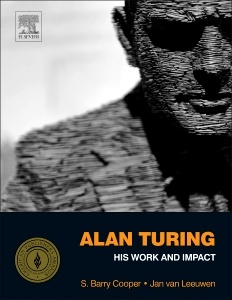Alan Turing His Work and Impact
Coordonnateurs : Cooper S. Barry, van Leeuwen J.

In this 2013 winner of the prestigious R.R. Hawkins Award from the Association of American Publishers, as well as the 2013 PROSE Awards for Mathematics and Best in Physical Sciences & Mathematics, also from the AAP, readers will find many of the most significant contributions from the four-volume set of the Collected Works of A. M. Turing. These contributions, together with commentaries from current experts in a wide spectrum of fields and backgrounds, provide insight on the significance and contemporary impact of Alan Turing's work.
Offering a more modern perspective than anything currently available, Alan Turing: His Work and Impact gives wide coverage of the many ways in which Turing's scientific endeavors have impacted current research and understanding of the world. His pivotal writings on subjects including computing, artificial intelligence, cryptography, morphogenesis, and more display continued relevance and insight into today's scientific and technological landscape. This collection provides a great service to researchers, but is also an approachable entry point for readers with limited training in the science, but an urge to learn more about the details of Turing's work.
Part I: How Do We Compute? What Can We Prove? 1.Alan Mathison Turing 2.On Computable Numbers, with an Application to the Entscheidungsproblem 3.On Computable Numbers, with an Application to the Entscheidungsproblem – correction 4.Review of Turing 1936-7 5.Computability and ?-definability 6.The p-function in ?-K-conversion 7.Systems of Logic based on Ordinals 8.A Formal Theorem in Church's Theory of Types 9.The Use of Dots as Brackets in Church's System 10.Practical Forms of Type Theory 11.The Reform of Mathematical Notation
Part II: Hiding and Unhiding Information: Cryptology, Complexity and Number Theory. 1.On the Gaussian Error Function 2.A Method for the Calculation of the Zeta-function 3.Some Calculations of the Riemann Zeta-function 4.On a Theorem of Littlewood 5.The Word Problem in Semi-groups with Cancellation 6.Solvable and Unsolvable Problems 7.The Word Problem in Compact Groups 8.On Permutation Groups 9.Rounding-off Errors in Matrix Processes 10.A Note on Normal Numbers 11.Turing's treatise on the Enigma (Prof's Book); Report by Turing on U. S. Navy cryptanalytic work and their machinery, November 1942; Speech System 'Delilah' - report on progress, 6 June 1944; Checking a Large Routine; An early program proof by Alan Turing; Programmers' Handbook for the Manchester electronic computer; Local Programming Methods and Conventions
Part III: Building a Brain: Intelligent Machines, Practice and Theory. 1.Lecture to the London Mathematical Society 2.Intelligent Machinery 3.Computing Machinery and Intelligence 4.Chess; Solvable and Unsolvable Problems 5.Intelligent Machinery: A heretical theory; Can digital computers think?; Can automatic calculating machines be said to think? 6.Some Remarks on the Undecidability Results
Part IV: The Mathematics of Emergence: The Mysteries of Morphogenesis. 1.The Chemical Basis of Morphogenesis 2.A Diffusion Reaction Theory of Morphogenesis in Plants 3.Morphogen Theory of Phyllotaxis; Geometrical and Descriptive Phyllotaxis; Chemical Theory of Morphogenesis; A Solution of the Morphogenetical Equations for the Case of Spherical Symmetry 4.Outline of the Development of the Daisy
Researchers and scientists interested in the context and significance of Turing's impact on artificial intelligence, artificial neural networks, morphogenesis, cryptology, the philosophy of mind, mathematics, computing, computer science, informatics, morphogenesis, philosophy and the wider scientific world.
Jan van Leeuwen is professor at the Department of Information and Computing Sciences at Utrecht University. He received a Ph.D. in mathematics in 1972 from the same institution. After having held several positions in computer science in the US, he returned to Utrecht as a faculty member in 1977. He was head of department from 1977 to 1983 and from 1991 to 1994, and served as dean from 1994 to 2009. His research interests extend to many branches of the theory and philosophy of computer science. He is a member of the Academia Europae, is the first recipient of a Distinguished Lorentz Fellowship Prize in the Netherlands, and holds an honorary doctorate from RWTH Aachen University. For more information, http://www.cs.uu.nl/staff/jan.html.
- 2013 winner of the prestigious R.R. Hawkins Award from the Association of American Publishers, as well as the 2013 PROSE Awards for Mathematics and Best in Physical Sciences & Mathematics, also from the AAP
- Named a 2013 Notable Computer Book in Computing Milieux by Computing Reviews
- Affordable, key collection of the most significant papers by A.M. Turing
- Commentary explaining the significance of each seminal paper by preeminent leaders in the field
- Additional resources available online
Date de parution : 06-2013
Ouvrage de 944 p.
21.4x27.6 cm


